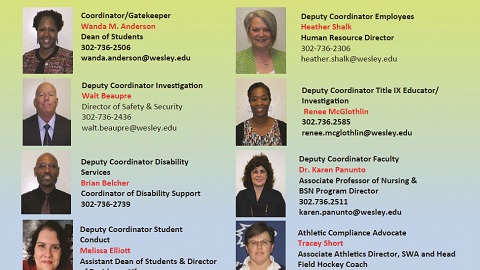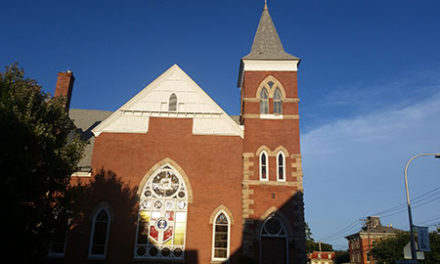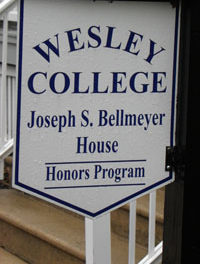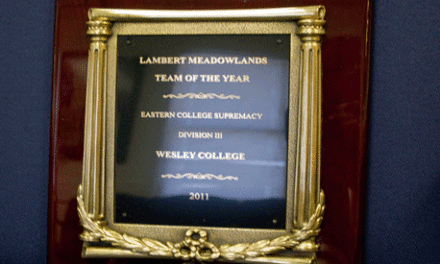By Kristen Griffith and Brittany Wilson, The Whetstone
Wesley College was reprimanded Oct. 12 by the Department of Education’s (DOE) Office for Civil Rights (OCR) for a Title IX violation that was reported after the college’s investigation of several students accused of sexual misconduct in the spring of 2015.
Four male students were expelled after college administrators discovered a female student had been unknowingly recorded having sex with one of the male students April 7 of last year.
Sophomore Jordan Dillard said he felt sorry for the female student.
“It’s hard to imagine how she feels,†he said. “Her privacy was violated in an unpleasant manner.â€
One of the expelled students, who claimed he was not involved, filed a complaint to the OCR May 14 of last year, claiming Wesley did not properly investigate the situation.
“OCR found that Wesley College violated Title IX by failing to provide accused students with essential procedural protections and also by not adhering to its safeguards provided for in its own disciplinary policies and procedures,†the DOE said.
Dr. Jeffrey Mask, religion and philosophy professor, said he there’s no point for Wesley to have its own policies if the administration isn’t going to follow them.
“I don’t know if someone got in a hurry, but that’s really bad judgment,†he said.
The first report to the College, on March 31, 2015, came from a faculty member, who informed a Wesley Title IX team member that a couple students in her class spoke about a sexual misconduct incident involving Wesley students that happened off campus.
Members of a fraternity had live-streamed one of their own having sex with a female student without her knowing.
One of the four male students denied he was involved. The female student told Wesley’s Title IX team she did not believe the student had been involved.
The College decided to hold a hearing with that student anyway because “the accused student was identified by witnesses as being involved in the planning and execution of the live streaming,†the OCR said.
Sophomore Jordan Dillard said the accused student should have tried to stop the others from recording.
“At least the (Title IX team) would know he was trying to do the right thing and stop the situation before it started,†he said. “Even though you weren’t involved, you’re still part of the problem for not saying something to somebody after the incident happened.â€
The OCR complaint, however, only addressed Wesley’s procedural mistakes, not the student’s guilt or innocence.
“The Title IX team went through recent training and titles are being adjusted as training happens,†Renee McGlothlin, Title IX educator, said.
The accused student did not have the opportunity to defend himself, OCR said. He was never interviewed, Wesley provided him the wrong policies and procedures, he never received a copy of the incident report and not all the students involved were given the opportunity to provide witnesses and evidence at the hearing.
The accused student was expelled only a few weeks before he was set to graduate.
“There weren’t any sinister intentions here, it was simply a matter of missing a step in the procedures,†Dr. Linda De Roche, English professor, said. “We haven’t been censored in any way or asked to pay a fine. We’ve simply been asked to make certain that we follow our procedures and have a tightening of procedures.â€
She said handling sexual misconduct cases shouldn’t be an internal affair. She said victims might be more likely to report to police rather than professors and peers, and justice will most likely be served.
Mask, who has served many times on judicial boards, also said controversy can come from some of the rules that guide the judicial boards.
“In a college judicial board, we aren’t held to the same standards that a court of law would be held to,†he said. “In most instances, the worst thing that’s going to happen to a student at a college judicial board is we’re going to say you can’t finish your education here. Whereas in a court of law there are much more serious penalties.â€
Mask said their concern is more for the student body rather than the rights of an individual student.
Sophomore Hakeem Sansbury said the College shouldn’t rush to judge the accused so quickly.
“Being a male at Wesley and hearing that makes me look at Wesley way differently,†he said. “What if that was me and I wasn’t involved? This could have happened to me.â€
The College violated Title IX in several cases from 2013 to 2015 when it “provided no evidence that accused students were interviewed before receiving interim suspensions, some on the same day,†the OCR said.
“OCR has concerns that the Title IX Coordinator and/or other Title IX Team members were inadequately trained to effectively fulfill their Title IX responsibilities,†the organization said.
Before OCR released its findings, Dr. Jack Barnhardt, psychology professor, said he didn’t think the faculty Title IX training was necessary.
“Some of these processes seem like they’re overcomplicated,†he said. “Why can’t the (Title IX) signs just say, if you hear anything, see anything, suspect anything, tell this designated person?â€
Barnhardt said the designated person or people should receive all the training. He also said he thinks the complications come from Title IX, not Wesley.
“I think it’s just the way the (Title IX) rules are written,†he said. “If anything, (Wesley’s) procedures are more than adequate—we are making sure we cross every ‘T’ and dot every ‘I.’â€
Wesley agreed to follow the steps necessary to remedy the violations.
A few of those steps include properly completing the investigation of the 2015 incident, publishing an anti-harassment statement, revising their Title IX grievance procedures, providing Title IX training to college community and enhance outreach and feedback for students.
“They should have informed the students about this,†Kenya Gorham said. “They’re quick to hand out a citation but can’t follow procedures. It’s hypocritical and unprofessional.â€
Following the public announcement, the college acknowledged its mistakes.
“Wesley College appreciates the insights and recommendations provided by the Office of Civil Rights, and will incorporate them into our ongoing efforts of providing our students and community an educational environment that is second to none,†Wesley College said in a statement.
Kabrea Tyler and Kirsten Nguyen contributed to the reporting of this story.
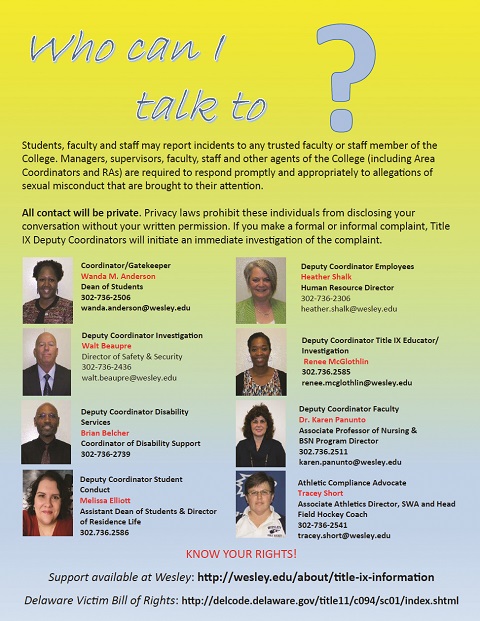
Title IX Flier

